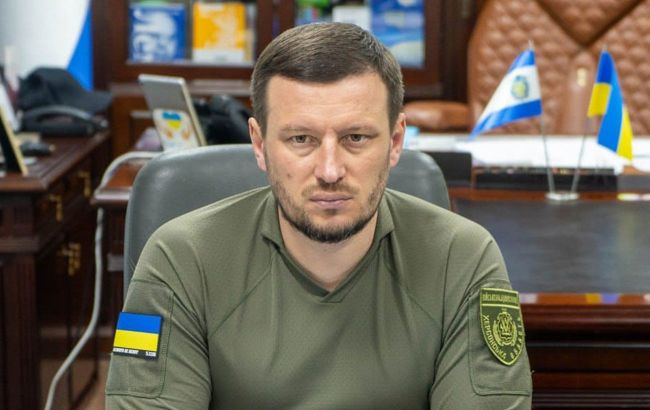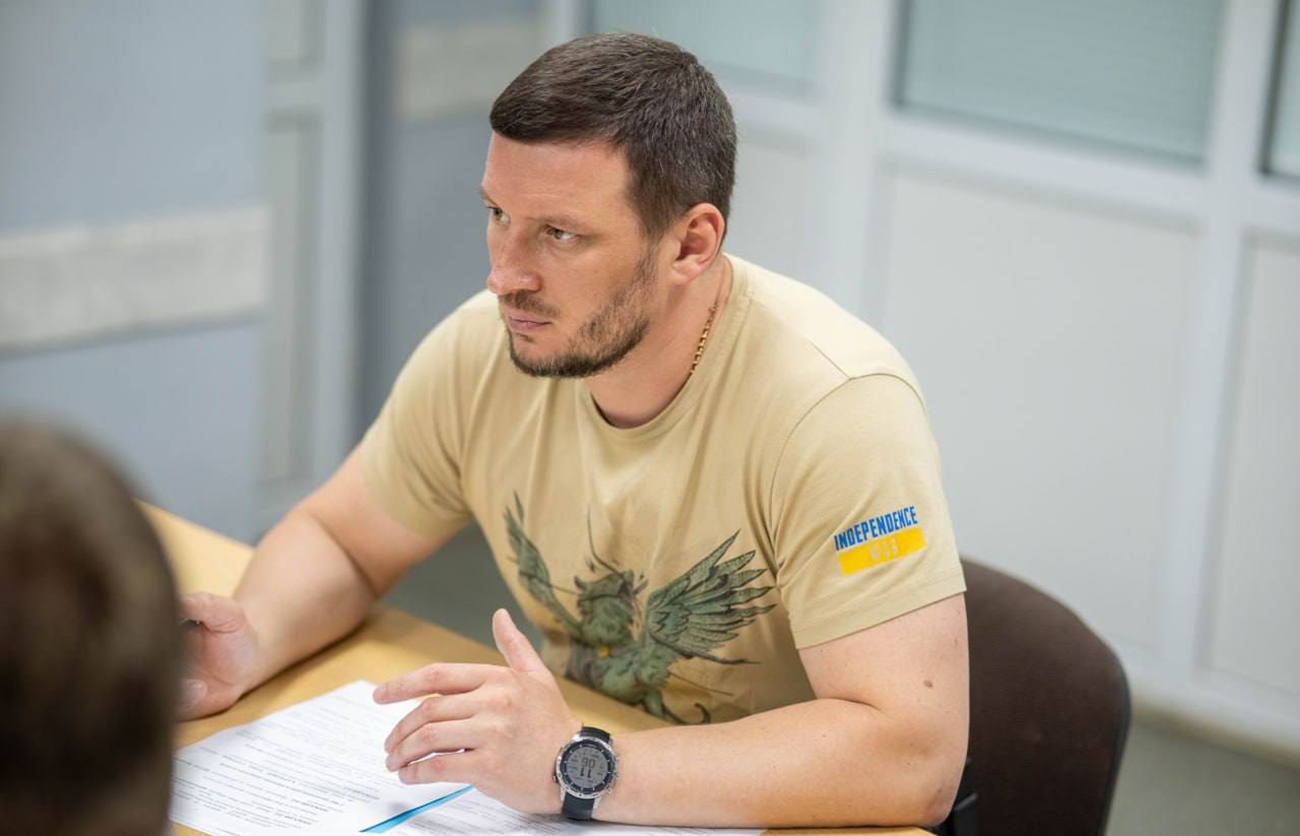'We have an explosion every two minutes,' head of Kherson regional administration
 Oleksandr Prokudin, head of the Kherson Regional Military Administration (Photo: Facebook)
Oleksandr Prokudin, head of the Kherson Regional Military Administration (Photo: Facebook)
How the Kherson region lives under constant shelling, whether people have electricity and water, and what is happening in the occupied territories - head of the Kherson Regional Military Administration Oleksandr Prokudin shared in an interview with RBC-Ukraine.
Here are the key takeaways from the conversation.
The Kherson region is 70% occupied, so the Russian army regularly shells the territories controlled by Ukraine, literally leveling villages and the regional center, the city of Kherson. After eight months of occupation, residents still feel the consequences, and they say that constant shelling is not as frightening as living under the control of the Russian army.
The proximity to the occupiers is evident - Russian troops destroyed the Kakhovka Hydroelectric Power Plant, after which the region was submerged, and they looted the famous Askania-Nova Reserve. In the occupied territories, the local authorities actively implement a pro-Russian agenda, from education to mobilization. Nevertheless, people in both liberated and occupied areas believe in victory and are waiting for the Ukrainian Armed Forces.
Operational situation in the region and shelling
In the Kherson region, 228 populated areas have been de-occupied. As of July 2024, approximately 168,000 people live in the liberated territories - one-third of the population that lived in the region before the full-scale invasion. Among them, more than 70,000 are elderly people, 14,000 are children, and about 31,000 residents have the status of internally displaced persons (IDPs) who came from the left bank or farther, to safer communities.
Shelling in the region does not subside. According to the head of the regional military administration, Russian troops are shelling all the settlements that have been de-occupied.
"If you take everything that is happening in the region, you could say that we have an explosion every two minutes. That is, if you break it down by intensity, the residents of the Kherson region generally hear explosions every two minutes," says Prokudin.

Oleksandr Prokudin, head of the Kherson Regional Military Administration (Photo: Facebook)
Since the beginning of the year, Russian troops have shelled the Kherson region more than 28,000 times with rockets, drones, and cluster munitions. In the last thirty days alone, the invaders have attacked the region with drones nearly 3,200 times. In July, the Russians shelled the region with 270 cluster munitions.
"They are now hitting everything they can reach - ambulance cars, police, rescuers. Many cars have burned, and they are targeting people while they are simply walking down the street."
Prokudin attributes the increased frequency of shelling to a rotation - more "active" soldiers have arrived in positions who want to earn favor, so they have increased the intensity. It is not entirely clear why Russian troops continue to target Kherson, given that there are no military objectives left in the city. According to Prokudin, this is done to keep residents in constant fear and panic.
— They choose civilian infrastructure as targets. For example, our educational institutions - the Kherson State Institute, our Marine Academy. Churches, again. Almost everywhere critical infrastructure has been hit, all transformer stations, gas pipelines, and so on. This is just intimidation so that we have no gas and light," adds the head of administration.
Public utilities and blackouts in the region
Due to constant shelling, some settlements in the region are almost constantly without power - they are impossible to electrify because the Russians are shooting at repair teams. Regarding the heating season, as of today, Kherson is 53% ready. Only the city has a centralized heating supply, so the rest of the region relies on its own resources. Prokudin also reported that several boiler houses have already been equipped with cogeneration units, which are capable of providing autonomous power even if there is no electricity.
"For the heating season, we are working with international partners. We have 77,000 people in need of heating materials. Last year we managed everything, and all categories of the population in the Kherson region were provided for," says Prokudin.
Situation in occupied territories
Today, nearly 70% of the Kherson region is occupied - 468 settlements. Russian troops are engaged in raiding properties, which they call "nationalization of abandoned property." In reality, they are stealing the homes of those who have left. They also threaten to take homes from people who have not registered them according to Russian law. In some settlements, the Russians are putting up signs on buildings reading "Property of the RF." Eventually, the property is handed over to the FSB, police, and military.
Furthermore, the Russians are forcing residents to take Russian passports. If a resident of Kherson does not want to take a Russian passport, they are first fined and then subjected to more severe methods. The Russian military has also introduced a new subject in schools called "Defense of the Fatherland."
"Yes, that’s their "Defense of the Fatherland." They plan to involve Russian military personnel in these classes, which will include weapons training. I have seen this plan - there will be training in weapons of mass destruction and UAVs, and this is what they will teach our children."
Mobilization continues in the occupied territories. The Russians are offering 15,000 rubles ($167) to anyone who brings their neighbor to the military recruitment office.
"The latest interesting development is that since they were not allowed to the Olympics, they plan to hold a parody of the Olympic Games in Skadovsk. The so-called 'Taurian Children's Olympic Games,' concludes Prokudin.
Seaside resorts, Kakhovka HPP, Askania-Nova natural reserve
Today, the seaside city of Zaliznyi Port, once a very popular tourist destination, is occupied and thus deserted. The beaches are littered with garbage, and only local residents and Russian troops "have a rest" by the sea. As for the Kakhovka Hydroelectric Power Plant, the area that was previously underwater is restoring its ecosystem. A whole forest of several-meter-tall trees has grown over the station. For ecologists, this is good news, but economists say the station needs to be rebuilt because it is essential for the region’s development.
"The nature reserves were flooded, and we lost a lot, which will be felt for a long time. But life and nature continue to develop; we will see how it goes. Opinions among scientists and environmentalists are divided. Some say the Kakhovka HPP should not be rebuilt, while economically savvy people argue it is necessary because the region will not survive otherwise," says the head.
The Askania-Nova reserve is currently in a deplorable state - Russian troops have stolen and transported almost all the animals that were there to Russia.

Oleksandr Prokudin, head of the Kherson Regional Military Administration (Photo: Facebook)
Collaborators and traitors
In Kherson and the region, the arrest of gauleiters who collaborated with the enemy when the city was occupied continues. During the first half of the year, 317 cases have been opened concerning violations of national security, among which 216 are specifically for collaboration. During this period, suspicion has been announced for 231 individuals.
Work among traitors is ongoing, including government officials, members of various councils, law enforcement officers, and ordinary citizens. The motivations of collaborators vary.
"There are ideological persons, the ones who were so to say coerced, there are different individual cases, and there are opportunists. There are fewer of those damned idological ones, but they do exist," underlinesProkudin.
Mood of Kherson residents
Local residents are waiting for the liberation of the region because living under constant shelling is impossible. However, the vast majority say it is better to live under shelling than under occupation, which is much more difficult and terrifying.
"Everyone sees who their enemy is, who levels their city to the ground every day. And everyone understands that this will only end when the Defense Forces liberate the left bank or at least push the occupiers back by about 40 kilometers. Everyone believes in this," concludes Prokudin.

